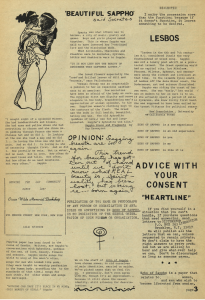
The feminist periodical Echo of Sappho directly reflects Sappho’s identity as a lesbian symbol throughout the 1970s. Their inaugural issue features a dedication “to the memory of Sappho” and defines the magazine as “for lesbians, feminists, and men who wish to free themselves from sexism” (Sappho and Hoffman 1). The issue opens with a page (pictured left) detailing information on Sappho’s life: her work, her interpretations of Greek mythology, and the island of Lesbos itself.
The rest of the issue features a wide range of content, including a short story, a variety of opinion pieces on current events, and a sidebar entitled “How to Tell Your Parents You’re a Lesbian.” It also contains a large number of “opinions” scrawled in messy handwriting across the middle of pages. “Opinion: Sagging breasts are in again,” one reads (Sappho and Hoffman 3). “Opinion: one must consider the times in which things took place. Women probably would have been left to die if they were suddenly left with no husband,” another proclaims (Sappho and Hoffman 14). Yet another reads, “Oedipus, who commits two outrages, is only blinded and exiled, while Jocasta (a woman) must die for only committing one” (Sappho and Hoffman 13). The very act of writing these opinions unapologetically in an editor’s handwriting with no accompanying text is powerful. So often, women are asked to explain or justify themselves, and these honest opinions with a startling lack of explanation speak volumes.
Throughout all issues of Echo of Sappho, quotes from Sappho’s poetry are interspersed among the pages. Most of them reflect on female beauty and love, as well as the female body, such as these lines: “Nothing can take its place in my mind / this beauty of girls” (Sappho and Hoffman 3), and “The small dark body’s lesbian loveliness that held the fire eternal” (Sappho and Hoffman 12).
Echo of Sappho continued throughout the next few years as a prominent lesbian feminist journal, yet released its last issue in fall of 1973. Till the end, the editors continued to publish a wide range of art, writing, and opinions by queer women, interspersed with mentions of and quotes from Sappho herself.
Works Cited:
Sappho, and Nancy Hoffmann. “Echo of Sappho.” Echo of Sappho, vol. 1, no. 1, Sisters for Liberation, June 1972, pp. 1–16, https://jstor.org/stable/community.28036004.
